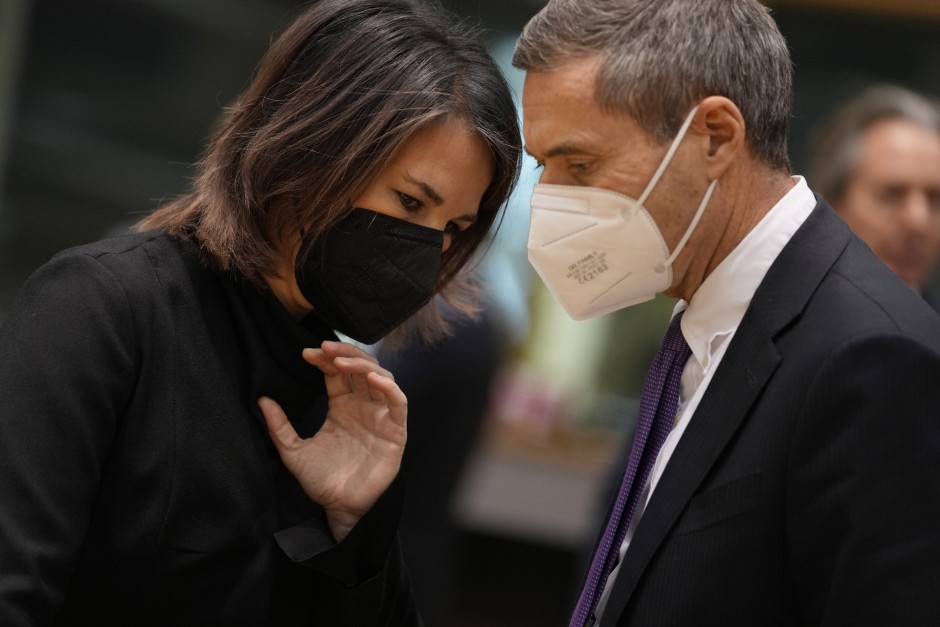
ZIran was on the agenda of EU foreign ministers for the third time in a row on Monday. For the third time they imposed sanctions on the country for suppressing the opposition movement and supplying drones to Russia. This time the deliberations were overshadowed by the second execution of a protester. Just before the ministers met, a 23-year-old man was publicly hanged in Mashhad. “This is obviously a blatant attempt at intimidation,” said German Foreign Minister Annalena Baerbock upon arriving in Brussels. It is directed against all people in Iran “who, like us, want to live in freedom”.
The Green politician combined this with a remarkable announcement about the nuclear negotiations. There have been “no real negotiations with Iran” for almost a year, she said – although the EU’s chief negotiator Enrique Mora has spent weeks if not months in Vienna, where the talks are ongoing. Mora had repeatedly reported progress and signs of hope, but not since Mahsa Amiri’s death in mid-September, which marked the beginning of the uprising against the mullahs’ regime.
Baerbock added “that there will definitely be no change” – in the stalled negotiations – “in this current situation”. That was not meant as a description of the Iranian position, but as a normative announcement to Tehran. “A system that treats its people like this cannot rely on the fact that there will continue to be halfway normal relations with the EU,” she explained.
EU also tightens course on nuclear deal
In any case, Germany is getting close to the point at which it no longer wants to take political account of the nuclear agreement, which the EU until recently considered the most important success of its common foreign policy. Other countries also see it that way, as an EU official hinted before the meeting: “It is becoming more and more complicated for the EU to commit itself to the nuclear agreement.” Of course, this does not apply to the European External Action Service. The belief that “there is no better way to prevent Iran from acquiring nuclear weapons” continues to apply here.
In the conclusions on Iran – the first in three years – the ministers reaffirmed their “continued support for the comprehensive and effective implementation of a restored nuclear agreement”. In the very next sentence, however, they accused Tehran of continuing to escalate its nuclear program and thus exacerbating the situation in the region. The EU will “invest” everything politically and diplomatically to prevent Iran from acquiring nuclear weapons. In the past, when people talked about investments, they talked about lifting sanctions. Before this point, there are seven others in which the Iranian state is condemned in the strongest possible terms for its brutality, torture and death sentences.
Baerbock was a driving force behind these conclusions, with which the EU states are sharpening their course towards Tehran. For the Foreign Minister, this is about the credibility of her “value-based” and “feminist foreign policy”. The text speaks of “systematic discrimination against women and girls” and of “gender-specific violence”. However, the Revolutionary Guard, which Baerbock wants to classify as a terrorist organization, does not appear in it. However, the sanctions, which were only published later in the Official Journal, are said to be aimed at several high-ranking members.
The second important topic during the deliberations of the foreign ministers was the financial endowment of the so-called peace facility. It was provided with 5.7 billion euros for seven years. Above all, the EU countries wanted to equip the police officers and soldiers who train them in Africa. Things turned out very differently with the Russian invasion of Ukraine. So far, three billion euros have been spent to reimburse member states for arms deliveries to Kiev. Two years after the start of the new financial period, only 810 million euros are left in the special pot that was set up alongside the regular budget because the military cannot be financed from the budget.
After long and difficult consultations, the EU ambassadors agreed to increase the total funds by 5.5 billion euros in two steps. The first step, two billion euros, is to take place in January, the second “if necessary” by 2024 at the latest. it always takes place in tranches of EUR 500 million. However, one country did not agree with this: Hungary. It was therefore uncertain whether the foreign ministers would be able to reach an agreement. In this case it is only unanimous. Diplomats pointed out that Budapest is blocking almost all decisions because of the dispute over the rule of law. That should be the subject immediately after the Foreign Council, in another meeting of the ambassadors.









